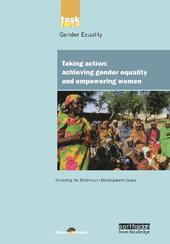
|
Gender Equality: Taking Action: Achieving Gender Equality and Empowering Women
Paperback
Main Details
| Title |
Gender Equality: Taking Action: Achieving Gender Equality and Empowering Women
|
| Authors and Contributors |
By (author) The UN Millennium Project
|
| Series | UN Millennium Development Library |
|---|
| Physical Properties |
| Format:Paperback | | Pages:280 | | Dimensions(mm): Height 253,Width 177 |
|
| ISBN/Barcode |
9781844072224
|
| Classifications | Dewey:305.42 |
|---|
| Audience | | Undergraduate | | Postgraduate, Research & Scholarly | | Professional & Vocational | |
|---|
| Illustrations |
Figures, tables, boxes, index
|
|
Publishing Details |
| Publisher |
Taylor & Francis Ltd
|
| Imprint |
Earthscan Ltd
|
| Publication Date |
1 June 2005 |
| Publication Country |
United Kingdom
|
Description
The Millennium Development Goals, adopted at the UN Millennium Summit in 2000, are the world's targets for dramatically reducing extreme poverty in its many dimensions by 2015i? income poverty, hunger, disease, exclusion, lack of infrastructure and shelteri? while promoting gender equality, education, health and environmental sustainability. These bold goals can be met in all parts of the world if nations follow through on their commitments to work together to meet them. Achieving the Millennium Development Goals offers the prospect of a more secure, just, and prosperous world for all. The UN Millennium Project was commissioned by United Nations Secretary-General Kofi Annan to develop a practical plan of action to meet the Millennium Development Goals. As an independent advisory body directed by Professor Jeffrey D. Sachs, the UN Millennium Project submitted its recommendations to the UN Secretary General in January 2005. i? The core of the UN Millennium Project's work has been carried out by 10 thematic Task Forces comprising more than 250 experts from around the world, including scientists, development practitioners, parliamentarians, policymakers, and representatives from civil society, UN agencies, the World Bank, the IMF, and the private sector. This report lays out the recommendations of the UN Millennium Project Task Force on Education and Gender Equality. The Task Force recommends seven strategic priorities: strengthen postprimary education for girls while ensuring universal primary education; guarantee sexual and reproductive health and rights; reduce women's and girls' time burdens; guarantee property and inheritance rights; eliminate gender inequality in employment; increase women's participation in government; and significantly reduce violence against women. Action on these priorities will enable countries in every region of the world to achieve gender equality and women's empowerment by 2015.
Author Biography
The Millennium Project was commissioned by the UN Secretary-General and sponsored by the UN Development Group, which is chaired by the Administrator of the United Nations Development Programme. The report is an independent publication that reflects the views of the members of the Task Force on Education and Gender Equality, who contributed in their personal capacity.
Reviews"This volume is a product of the UN Task Force on Education and Gender Equality, one of the groups assessing progress toward the UN Millennium Development Project goals. One goal is to dramatically reduce extreme poverty by 2015 while keeping gender equality firmly in view. Compiled by an impressive group of specialists, the book elucidates gender-linked strategies for poverty alleviation such as increasing girls' access to postprimary education, strengthening programs for reproductive health, guaranteeing women's property and inheritance rights, and reducing gender inequality in employment. As usual in UN documents, the tables are worse than useless since the data are collected from diverse sources and are virtually never truly comparable. But the tables are a relatively small part of the study, and many of the observations about the specific situations facing poor women and girls in various countries and regions are cogent and thought provoking. The preface states that 'the main audience for this report is the UN system and donor development agencies, policy makers at the national level, and women's advocacy organizations," but the book belongs in every city and college library as well. Summing Up: Highly recommended. All levels/libraries."--A. H. Koblitz, Arizona State University in Choice
|